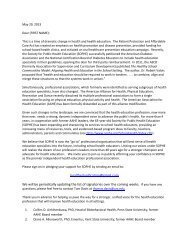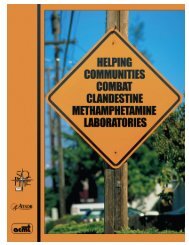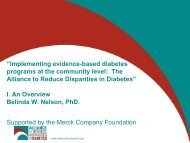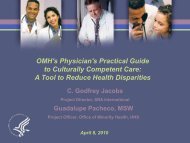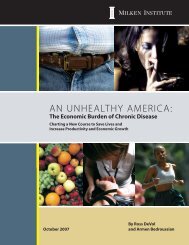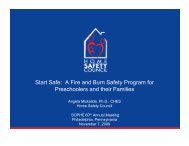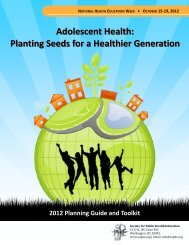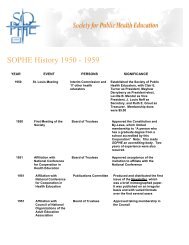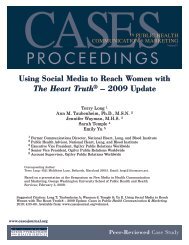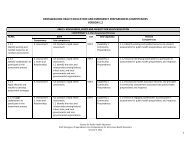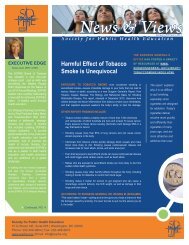healthy people 2020 - Society for Public Health Education
healthy people 2020 - Society for Public Health Education
healthy people 2020 - Society for Public Health Education
You also want an ePaper? Increase the reach of your titles
YUMPU automatically turns print PDFs into web optimized ePapers that Google loves.
✯ Conference Abstracts ✯<br />
friday | november 5<br />
Outcomes of the National <strong>Health</strong> Educator Job Analysis:<br />
Implications <strong>for</strong> <strong>Health</strong>y People.<br />
Eva Doyle, PhD, MSEd, CHES, Baylor University; Linda Lysoby, MS, CHES,<br />
CAE, National Commission <strong>for</strong> <strong>Health</strong> <strong>Education</strong> Credentialing, Inc; Melissa<br />
Rehrig, MPH, CHES, National Commission <strong>for</strong> <strong>Health</strong> <strong>Education</strong><br />
Credentialing, Inc<br />
background: Since the initial role delineation of health educators in<br />
1988, the health education profession has continued to evolve. Over the<br />
course of the years in addition to the development of the responsibilities<br />
and competencies <strong>for</strong> the entry-level health education specialist, a<br />
certification process has been put in place, advanced-level responsibilities<br />
and competencies have been developed, and two competency update<br />
projects has been completed.<br />
theoretical basis: The theory-based competencies that frame the<br />
preparation, professional development, and work of health education<br />
specialists can contribute to the achievement of the <strong>Health</strong>y People 2010<br />
objectives 1-7, 23-8, and 23-9 through health professional training.<br />
Competencies are an essential component of outcomes-based education<br />
<strong>for</strong> many health-related professions and are critical in credentialing.<br />
<strong>Health</strong> education was the first population-based profession to develop<br />
competencies, which have been used in measuring quality assurance<br />
systems <strong>for</strong> more than 20 years. Yet, competencies <strong>for</strong> any profession<br />
must not be fixed, but rather re-verified in contemporary practice and<br />
updated over time.<br />
methods: To meet recommendations from the National Organization <strong>for</strong><br />
Competency Assurance (NOCA), the <strong>Health</strong> Educator Job Analysis Study<br />
(HEJA) was completed to validate the contemporary practice of entry- and<br />
advanced-level health education specialist. A systematic model of practice<br />
was utilized to develop and empirically validate the knowledge base<br />
required of health education specialists. A stratified random sample of<br />
approximately 4500 health education specialist from various professional<br />
work settings were surveyed online in the spring of 2009.<br />
interventions/partnerships: Experts from the Professional Examination<br />
Services (PES) conducted the analysis, with input from the<br />
American Association <strong>for</strong> <strong>Health</strong> <strong>Education</strong> (AAHE), National Commission<br />
<strong>for</strong> <strong>Health</strong> <strong>Education</strong> Credentialing (NCHEC), and <strong>Society</strong><br />
<strong>for</strong> <strong>Public</strong> <strong>Health</strong> <strong>Education</strong> (SOPHE). Sixty-two (62) volunteer health<br />
educators were selected by a steering committee to serve in various<br />
capacities throughout the project. The volunteers represented an array of<br />
work-settings, educational and demographic backgrounds, and varying<br />
levels of experience. Implications of research results <strong>for</strong> enhanced practice<br />
– This presentation will highlight findings and recommendations<br />
from the HEJA related to the updated competencies and sub-competencies<br />
of both the entry – and advanced-level health education specialists.<br />
Also, presenters will discuss the implications to professional preparation<br />
programs that prepare the future health profession work<strong>for</strong>ce and details<br />
of the advance-level certification, MCHES. The relevance and application<br />
of HEJA outcomes to <strong>Health</strong>y People initiatives and goal achievement<br />
will be discussed.<br />
Exam Item Writing <strong>for</strong> the <strong>Health</strong> <strong>Education</strong> Specialist:<br />
“Yes This Will be on the Test.”<br />
Jacquie Rainey, DrPH, Professor and Associate Dean, College of <strong>Health</strong> and<br />
Behavioral Sciences University of Central Arkansas; Sharon Thompson,<br />
MPH, PhD, CHES, University of Texas at El Paso; David Brown, EdD,<br />
CHES, Jackson State University; Linda Lysoby, MS, CHES, CAE,<br />
National Commission <strong>for</strong> <strong>Health</strong> <strong>Education</strong> Credentialing, Inc.<br />
Learning to write valid and reliable exam questions is a vital skill <strong>for</strong> the<br />
health education specialist practicing in any setting (academic, community,<br />
worksite, school, and medical). Test items assist the health educator<br />
to evaluate and research health-related knowledge. The National Commission<br />
<strong>for</strong> <strong>Health</strong> <strong>Education</strong> Credentialing (NCHEC) was established<br />
to administer a credentialing system, including certification of health<br />
education specialists as a mechanism <strong>for</strong> individual quality assurance.<br />
The completion of the National <strong>Health</strong> Educator Job Analysis (HEJA)<br />
has necessitated the development of a new Certified <strong>Health</strong> <strong>Education</strong><br />
Specialist (CHES) examination based on the resultant responsibilities,<br />
competencies, and sub-competencies. Directors on NCHEC’s Division<br />
Board <strong>for</strong> Certification of <strong>Health</strong> <strong>Education</strong> Specialists (DBCHES) who<br />
are currently developing exam items <strong>for</strong> the revised CHES and newly<br />
created MCHES examinations will provide an intensive test item writing<br />
session to assist participants develop these important skills. The purpose<br />
of this presentation it to increase the skills of the participants in test item<br />
development, construction, and evaluation grounded in sound learning<br />
theory. Participants will learn the guidelines used to write exam questions<br />
and what constitutes a “good” question. Specific in<strong>for</strong>mation will<br />
be provided concerning the process by which test items are validated and<br />
placed into the appropriate responsibility and competency <strong>for</strong> the CHES<br />
and MCHES. The exam blueprint containing the new rubric and percentage<br />
of each responsibility and competency will be explained. These<br />
newly acquired skills can be generalized to a variety of health education<br />
programming to enhance the rigor of research and evaluation.<br />
Parallels between the Professionalization of <strong>Health</strong> <strong>Education</strong><br />
and the Medical Profession’s Historic Quest <strong>for</strong> Licensure.<br />
Kathy DeBarr, MS, PhD, Associate Professor, Department of <strong>Public</strong> <strong>Health</strong>,<br />
University of Illinois at Springfield<br />
This presentation chronicles the history of physicians’ struggles to<br />
professionalize the field of medicine and draws parallels between this<br />
history and ef<strong>for</strong>ts put <strong>for</strong>th by health educators to gain the populace’s<br />
recognition of health education as a profession. <strong>Health</strong> education is in<br />
many ways a nascent profession, much like the practice of medicine<br />
prior to medical licensure. From the Colonial period through the 1850’s<br />
medicine in the United States was practiced by lay persons, planters,<br />
clergy persons, apprentice trained physicians, barber surgeons, apothecaries,<br />
and “regular” or university trained physicians (Starr, 1982). In<br />
other words, almost anyone could practice medicine. Similarly, today<br />
virtually anyone can proclaim himself/herself to be a health educator.<br />
This phenomenon occurs despite establishment of the Certified <strong>Health</strong><br />
<strong>Education</strong> Specialist (CHES) credential and the <strong>for</strong>thcoming 2011<br />
advanced level credential Master Certified <strong>Health</strong> <strong>Education</strong> Specialist<br />
(MCHES). Twenty years after establishing the CHES, Arkansas (Arkansas<br />
<strong>Health</strong> Educator Practice Act) and New Jersey (N.J. Dept. <strong>Health</strong> and<br />
Senior Services) require the credential to practice as a health educator.<br />
Perhaps the time has come, as it did <strong>for</strong> the medical profession, to<br />
consider licensure as a viable alternative. What better way can there be<br />
to achieve the Mile High Expectations and educational goals of <strong>Health</strong>y<br />
People <strong>2020</strong> and beyond?<br />
sophe conference ✯ november 4-6, 2010 23




